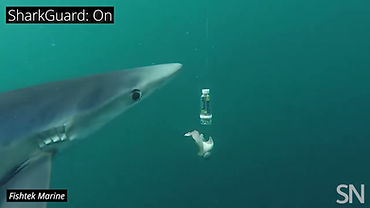By: Bryan Li
SharkGuard, an electric blue cylinder attached to fishing lines, releases a pulse of electricity every two seconds that deters sharks and rays by overwhelming their sensory system for a short time. This causes the sharks to flee and avoid getting caught accidentally.
Sharks and rays often accidentally get snagged by fishermen looking for other fish in a process called bycatch. This is a huge problem because the animals accidentally getting caught waste the fishing boat’s time and may lose their lives. Many shark species are endangered, and bycatch only further whittles dowm their population Hooks fitted with Sharkguard reduced bycatch of blue sharks by 91 percent, from 6.1 sharks caught per 1000 hooks to 0.5 sharks. It also reduced bycatch of pelagic stingrays by 71%, going from seven to two rays caught per 1000 hooks. An average fishing boat might have 10,000 hooks, so a boat employing Sharkguard would catch 5 blue sharks instead of 61, and 20 pelagic stingrays instead of 70.
Rob Enever, a marine biologist involved in SharkGuard’s testing, says that “massive recovery of these pelagic shark populations” will happen if all fishing boats were outfitted with SharkGuard, as pelagic shark populations are mostly endangered or close to being endangered. However, this device could create further problems. Tuna catch rates were very low throughout the study, which indicates that tuna may also be affected. The current battery has to be charged every few weeks, and the team hopes that they can devise a battery that can be charged while the fishing line isn’t in use. Evever’s team is also trying to make SharkGuard smaller, cheaper, and more convenient to use.
David Shiffman, a marine biologist and faculty research associate at Arizona State University, says that even if SharkGuard is perfected, “fixing this problem of bycatch is going to require a lot of different solutions working in concert.”
Enever says that “We’re at a situation now where many of our pelagic species are either critically endangered, endangered, or vulnerable… but there’s people out there…trying to resolve these things. There’s hope for the future.”











